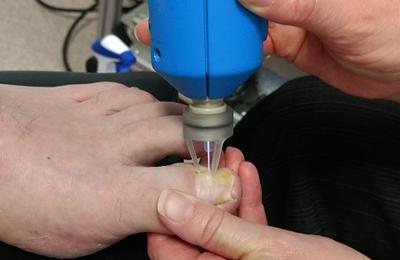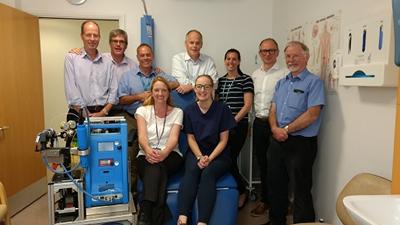New hope for treating fungal nail infection without antimicrobials - Southampton researchers launch the CapToe Study

Researchers in Southampton are leading a study of a new treatment for fungal nail infections, which may revolutionise the treatment of this common problem and in doing so, reduce the need for antimicrobials.
Fungal nail infection (onchomycosis) is a common and stubborn condition that causes discoloration and changes in the appearance of nails, usually the toenails. Current treatments are often ineffective or slow to work; therefore there is a need for new treatments, with limited side effects which are better at clearing it.
Now, experts from the University of Southampton’s Network for Antimicrobial Resistance and Infection Prevention (NAMRIP) together with colleagues from Solent NHS Trust are trialling a new treatment developed by BOC, using cold atmospheric gas plasma.
“Just over 4% of the adult population have fungal nail infections, and although it might be seen as a purely cosmetic problem, in people with diabetes it can lead to very serious infections which are difficult to treat,” explained Dr David Voegeli, the study lead.
Dr Voegeli, an Associate Professor of Nursing at the University, and his team are looking to recruit 80 people, with fungal infection in both of their big toenails, to participate in the study. The study will be based within the Solent NHS Trust’s Podiatry service at Adelaide Health Centre in Southampton. Following a screening test to determine eligibility, participants will be allocated to receive one of four treatment regimens using the novel device, and will be followed up for 12 months.

Chair of NAMRIP, Professor Tim Leighton, said:
"I am delighted by this initiative and very grateful to David (Voegeli) for all his hard work - like several NAMRIP members, I have had the pleasure of collaborating with David in a number of exciting projects tackling infection prevention and I know he and his team will make a fantastic job of this. It also chimes with our aims with the recent launch of Global-NAMRIP. NAMRIP has come up with novel approaches to tackle AMR, with potential treatments and diagnostics, ranging from the highly technical to the very simple (which might be more suitable, perhaps, to a rural zone in a low/middle income country, which is one reason why we launched Global-NAMRIP). Cold plasmas are obviously at the high-tech end, but if high-tech solutions can reduce the use of antimicrobials anywhere in the world, then the impact could well be global because AMR is a global problem".
The CAPTOE study team are, left to right standing: Dr Charles Potter (BOC); Dr Graham Bowen (Head of Podiatry, NHS Solent Trust); Dr David Voegeli (Chief Investigator, University of Southampton), Dr Ivan Bristow (University of Southampton), Dr Lindsey Cherry (Co-investigator, University of Southampton / NHS Solent Trust); Nick Pledge (BOC) and Henryk Herman (BOC). Sitting: Helen Romer; Charlie Dando (Research Podiatrists, NHS Solent trust).
Interested in taking part?
Anyone interested in taking part in the study can find out more by calling the research team on 07919 063451 or by email at CAPTOE@solent.nhs.uk